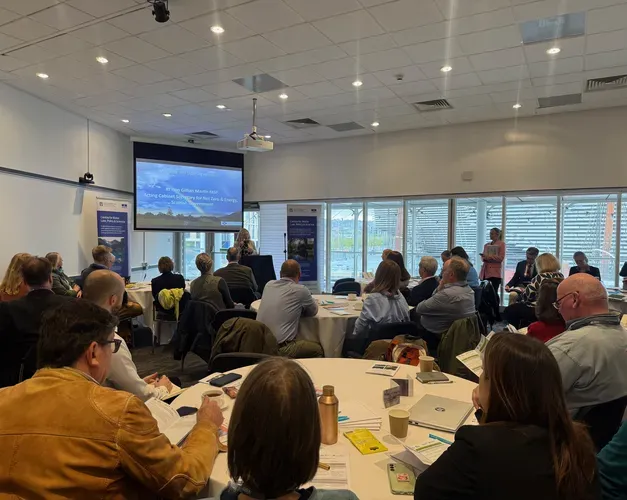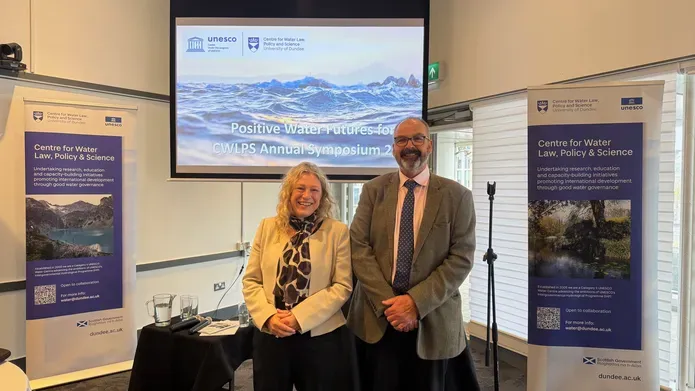Press release
International water experts meet in Scotland to celebrate 20-year anniversary of UK’s only UNESCO water centre
International water experts from four continents met in Scotland to mark the 20th Anniversary of the UK’s only UNESCO Category 2 Centre for Water Law, Policy & Science (CWLPS), on Thursday 24 April, at Discovery Point
Published on 24 April 2025


The two-day Symposium ‘Positive Water Futures for All’ celebrating the occasion will be opened by MSP Gillian Martin, the Acting Cabinet Secretary of State for Net Zero and Energy, at the Scottish Government.
Acting Cabinet Secretary, Gillian Martin, said: “Water and climate change are inextricably linked. Extreme weather events are making water more scarce, more unpredictable, more polluted, or all three.
“We all have a responsibility to look after this precious resource – and it is vital that we all work together and share knowledge – through events such as this symposium so we can create a water-efficient society and build towards a positive water future for Scotland and beyond.”
Academics based at Dundee’s CWLPS will present many of their achievements over the 20-year period, including hosting a visit to the Tweed Basin and Eddleston Water in the Scottish Borders, both recognised by UNESCO for their importance for hydrological research and their relevance to water resource management.
CWLPS researchers have been monitoring water levels and biodiversity at the site since 2010 and assessing the ability of nature-based (natural) flood management practice, such as restoring channel meanders, repairing wetlands and planting trees to slow down the flow and reduce the size of flood peaks, in a collaborative project called the Eddleston Water Project.
This project, led by the Tweed Forum, is funded by the Scottish Government in partnership with Scottish Environment Protection Agency (SEPA) and other key local stakeholders, with Dundee colleagues driving the detailed river flow assessments.
Representatives from five international water centres based in France, Greece, Japan, Nigeria and Poland will also attend the symposium and talk about their work, in an effort to share learnings globally across the UNESCO network.
Professor John Rowan, Director of the University’s CWLPS, said, “20 years is an important milestone to look back on, but more importantly to look forward, ensuring we continue to make a leading contribution to regenerative and inclusive water futures for all.
“We look at all aspects of water resources, including governance issues, with increasing attention to extreme events in the form of floods and droughts arising from climate change. Never before has our work been more relevant.”
Gillian Martin, Acting Net Zero Secretary, said: “Water and climate change are inextricably linked. Extreme weather events are making water more scarce, more unpredictable, more polluted, or all three.
“We all have a responsibility to look after this precious resource – and it is vital that we all work together and share knowledge – through events such as this symposium so we can create a water-efficient society and build towards a positive water future for Scotland and beyond.”
CWLPS was formally established in 2005. Early highlights linked to the founding Director, Professor Patricia Wouters, were shared around international waters and sought to resolve equitable access.
For example, the Centre’s experts worked to devise strategies for the management of cross-border waters in Central Asia, the Middle East and North Africa – including ratification of the UN Watercourses Convention.
Latterly, CWLPS has moved to focus on helping to deliver the UN’s Sustainable Development Goals, especially Goal six – Clean Water and Sanitation.
Another former Director Andrew Allan led collaborative work examining vulnerability to climate change in river deltas in Ghana, India and Bangladesh, resulting in evidence-based advice to the three governments.
Closer to home, recent work has supported the development and implementation of water policy and associated legislation in Scotland, along with studies into protecting the country against water scarcity.
Evaluating the potential of nature-based approaches to achieve natural flood management outcomes led to CWLPS’s involvement in the Tweed Basin.
The basin was awarded UNESCO HELP Basin status (Hydrology for the Environment, Life and Policy) in 2009 and has since emerged as an international exemplar of integrated catchment management.
Professor Rowan added, “Basic hydrological research continues to be a vital scientific pillar of the Centre providing the evidence-base aiding prediction, planning allocation, conservation and risk reduction of water resources for the benefit of the people (and ecosystems) within the river basins where they live”.
“CWLPS has been invited to lead revitalisation of the UNESCO’s HELP Flagship Initiative and will do so in the context of addressing the climate emergency and delivering Scotland’s international obligations to the 2030 Agenda and the UN Sustainable Development Goals.”
For more information, see UNESCO Centre for Water Law, Policy & Science’s website.